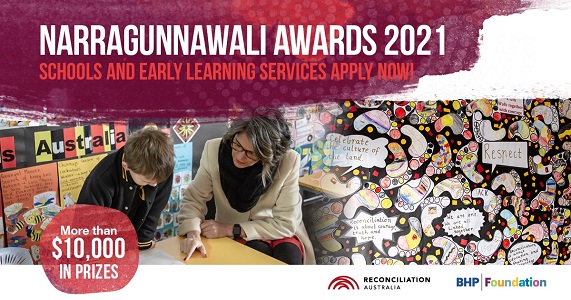
March 2021
Consultation on the Australian Curriculum Review opens soon
On 29 April 2021, the consultation period will open for the proposed revisions to the Foundation – Year 10 (F–10) Australian Curriculum, including for all the learning areas, the general capabilities and the cross-curriculum priorities.
A consultation website will be available for interested stakeholders and the public to review the proposed revisions to the curriculum and have their say via a survey format. The consultation window will be open until 8 July.
In June 2020, education ministers agreed that it was timely to review the Foundation – Year 10 Australian Curriculum. In preparation for the review, ACARA consulted widely with key education stakeholders and groups to define the approach and scope of the review. Since then, ACARA has established specialist teacher and curriculum expert reference groups to assist with the review and has undertaken extensive discussions with curriculum experts from jurisdictions and with practising classroom teachers. ACARA has also engaged with national subject professional associations, academics and other key stakeholder groups.
We will continue to provide further information in the lead-up to the public consultation window and look forward to receiving all feedback on the revisions during the consult period.
Visit the 'Curriculum review' page of the ACARA website to find out more on the review.

When is NAPLAN?
Students in Years 3, 5, 7 and 9 will take part in this year’s National Assessment Program – Literacy and Numeracy (NAPLAN) on the following dates:
- NAPLAN 2021 paper test window: 11–13 May
- NAPLAN 2021 online test window: 11–21 May
For more information about NAPLAN test dates, visit the 'Key dates ' page of the NAP website.
Is your school transitioning to online tests for NAPLAN this year?
Over 70 per cent of schools will participate in NAPLAN Online in 2021. Schools will also find useful information and tools on the following pages of the NAP website:
Watch the Understanding NAPLAN Online video (2 min 11 sec) to learn more.
To find out about technical requirements for NAPLAN Online, visit the Online National Assessment Platform website. Any schools requiring support about accessing the NAPLAN Online assessment platform should contact the test administration authority responsible for NAPLAN administration in their state or territory.
Accessibility options for students
Visit the NAP website to read about adjustments for students with disability and students with diverse learning needs, including some example adjustment scenarios and a guide for schools to assist students with disability to access NAPLAN Online. Schools will need to discuss appropriate adjustments for students with the test administration authority responsible for administering NAPLAN.
What are the changes to NAPLAN Online tests in 2021?
In the conventions of language test, the grammar and punctuation section will be locked for Years 3, 5, 7 and 9 when the spelling section is started. The locked section prevents students from using the words in the grammar and punctuation section to answer spelling questions, which is similar to the locked sections of the Years 7 and 9 ‘calculator – allowed’ and ‘calculator – not allowed’ sections of the numeracy test. This infographic provides an overview of the conventions of language test changes.
Any questions?
Visit:
For detailed information, contact your local test administrations authority.
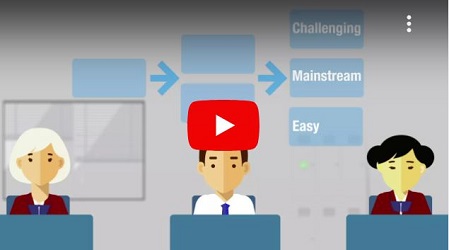
The NAP–CC national report 2019 released
The results of the National Assessment Program – Civics and Citizenship (NAP–CC) have revealed Australian students’ performance has plateaued when it comes to understanding the importance of our democracy and appreciating our national values.
The 2019 report, released in January 2021, shows 38 per cent of Year 10 students have reached the proficient standard and 53 per cent of Year 6 students have achieved the benchmark.
But the student survey results published in the sixth National Assessment Program – Civics and Citizenship report have also revealed some interesting insights: many students are concerned about a range of problems affecting Australia, like pollution, climate change and water shortages, while fewer students are concerned about terrorism.
The program tests students’ understanding of Australian democracy and system of government, the rights and legal obligations of citizens and the social values that underpin Australian society. It is undertaken in a sample of schools across the country every three years. A survey of students’ attitudes and engagement with civics and citizenship is also included.
Nearly two-thirds of Year 10 students surveyed have collected money for a charity or social cause, and there was an increase in the proportion of students at both year levels who believed participating in peaceful protests about important issues was an important attribute of good citizenship.
Click the images below to see our infographics on NAP–CC key results and NAP–CC student survey:
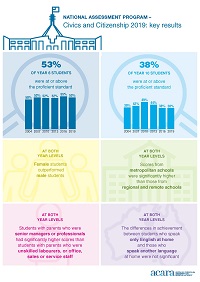
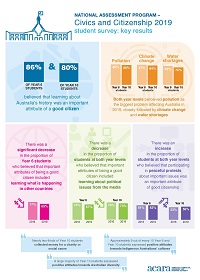
See more information on the NAP website.
Parents and students voice their opinions
We asked parents if they think it is important to talk to their kids about political and social issues, and what issues their kids seem most interested in and passionate about. Watch the video (1.46 min) to hear what they had to say:
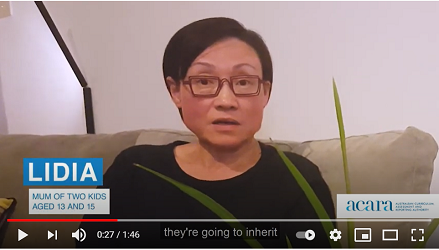
The survey shows that students in both Years 6 and 10 continue to believe that learning about Australia’s history is an important attribute of being a good citizen. However, there is a significant decrease in the number of Year 6 students who believe that important attributes of being a good citizen include learning what is happening in other countries. We asked a few students about their thoughts on these issues. Watch the video (4.36 min) to hear what they had to say:
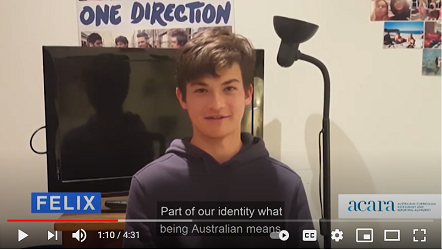
ACARA CEO speaks at the SMH Schools Summit
ACARA CEO, David de Carvalho, recently took to the stage as part of the third annual Sydney Morning Herald Schools Summit to discuss the upcoming Australian Curriculum Review.
“Another way to describe what we are hoping to achieve is that we want to give the Australian Curriculum the Marie Kondo treatment,” said Mr de Carvalho, who hopes the proposed revised curriculum will excite teachers.
“We want teachers to go on the public consultation website on 29 April and see a curriculum that they can’t wait to teach.
"We look forward to hearing views to help us improve the curriculum and ensure it serves our children, equipping them with the skills and knowledge they need to live fulfilling lives."
Whether you are a teacher, a parent, you work in education or are someone who has a particular interest in it, your feedback is important to us.
Read Mr de Carvalho's full speech (PDF 92 kb).
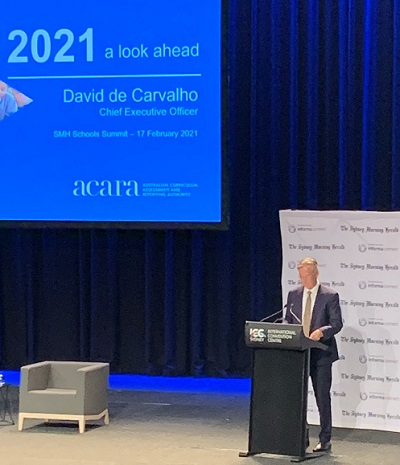
New education research body launches
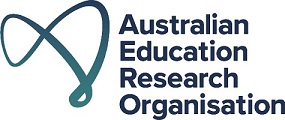
The Australian Education Research Organisation (AERO), a new national independent education research organisation, has been formed by Commonwealth, state and territory education ministers to improve access for educators to high-quality education evidence.
The organisation generates and makes high-quality evidence accessible and aims to enhance the use of evidence in Australian education.
Dr Jenny Donovan, AERO CEO, said, "By improving access to the quality of evidence, we hope educators and education professionals can make decisions confidently, leading to improved education outcomes for children and young people in Australia”.
To learn more about AERO or to sign up to its news and updates, visit the organisation's website.

Showcase your school’s outstanding reconciliation initiatives
If you haven’t already, apply now for the Narragunnawali Awards and be nationally recognised for your school’s reconciliation in education initiatives.
A cash prize of $10,000 is up for grabs, as well as media and promotional opportunities.
Finalists are acknowledged for strengthening relationships, building respect and providing meaningful opportunities in the classroom, around the school or service and with the community.
Applications close on Friday 30 April 2021.
For details, visit the Narragunnawali website.
